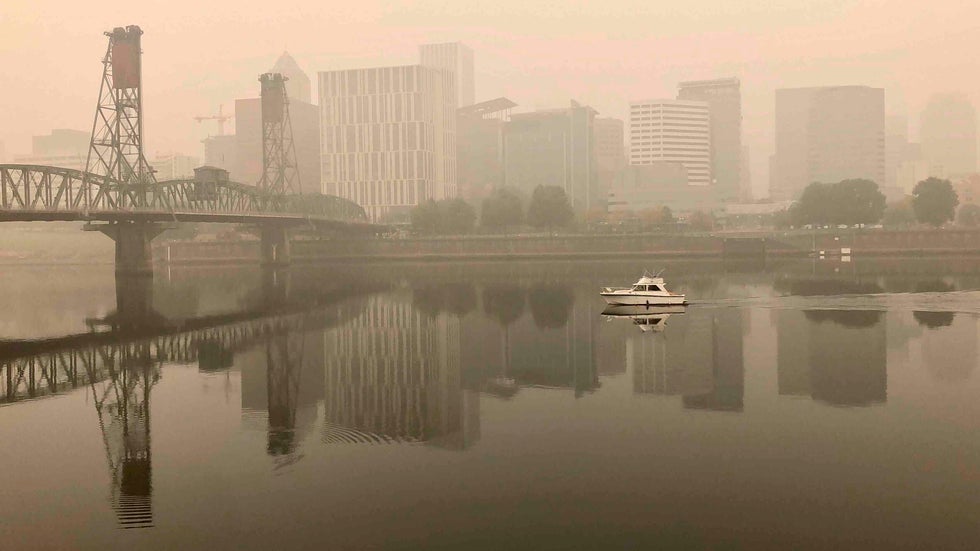Jan Wesner Childs
Air quality remained at hazardous or dangerous levels in both large cities and small communities up and down the West Coast, as toxic wildfire smoke smothered the skies, forcing people to stay indoors and sending some to hospitals.
Hazardous pollution levels persisted Monday in several Oregon cities – including Eugene, Salem and Portland. Hazardous is the highest category on the EPA's AirNow air quality index, which measures pollution levels on a scale from 0 to 500.
The AQI in the three Oregon cities ranged from 318 to 331 Tuesday afternoon. That was an improvement from the weekend, when Salem's AQI was above 500, prompting the EPA to label levels there "beyond index."
Mariposa, California, just outside of Yosemite National Park, neared 500 on the scale Tuesday.
(MORE: Will Extreme Weather Keep Getting Worse? Scientists Say Yes)
Seattle's air quality was ranked very unhealthy with an AQI of 267, while Los Angeles was rated unhealthy at 168.
Seattle, Portland and other cities in the region have had some of the worst pollution in the world in recent days, according to the World's Air Quality Index.
The Oregon Health Authority said Monday that 10% of recent emergency room visits statewide are due to asthma-like symptoms, KATU.com reported.
"Even in some places where there may be limited improvement at some times, that means dropping from one bad air category to the next-worst category," said Gabriela Goldfarb, Environmental Public Health Section Manager for the Oregon Health Authority. "We’re seeing that play out with health impacts to our community."
At these levels, even healthy people can experience discomfort, including irritation of the eyes, nose and throat, coughing, chest tightness and shortness of breath. Those with heart and lung disease or other health issues could face life-threatening conditions.
 A view of downtown Portland from the East Bank Esplanade is seen on Monday, Sept. 14, 2020.
A view of downtown Portland from the East Bank Esplanade is seen on Monday, Sept. 14, 2020.Officials advised residents to stay inside with the windows and doors closed.
While a pattern change later this week is expected to bring some relief, the smoke could linger for weeks in some areas.
Dan Borsum, an incident meteorologist working with the California fires, said air quality in the region might not improve until October, the AP reported.
"It’s going to take a substantially strong weather pattern to move all the smoke," Borsum said during a Sunday night fire briefing.
Tyler Kranz, a meteorologist for the National Weather Service in Portland, said it's going to take a "perfect balance" of winds to help dissipate the acrid haze.
"We need the winds to get the smoke out of here," Kranz said. "We just don’t want them to be too strong, because then they could fan those flames, and all of a sudden, those fires are spreading again."
NASA satellite images showed smoke drifting in the atmosphere over much of the U.S. in recent days.
The smoke forced Alaska Airlines to suspend or cancel flights to several airports in the West, including Portland and Spokane, Washington.
More than 6,300 square miles of land have burned across California, Washington and Oregon in a historic string of wildfires fueled by scorching heat, extreme drought and sometimes windy conditions.
The death toll in California rose to 25 Monday after officials confirmed a 15th death in the North Complex Fire, which is now tied for the fifth-deadliest fire ever recorded in the state.
At least 10 people have died in Oregon and one in Washington. Some of the blazes have been burning for weeks, but many were sparked during a record-breaking heat wave around the Labor Day holiday.
The Weather Company’s primary journalistic mission is to report on breaking weather news, the environment and the importance of science to our lives. This story does not necessarily represent the position of our parent company, IBM.
The Weather Company’s primary journalistic mission is to report on breaking weather news, the environment and the importance of science to our lives. This story does not necessarily represent the position of our parent company, IBM.

No comments:
Post a Comment